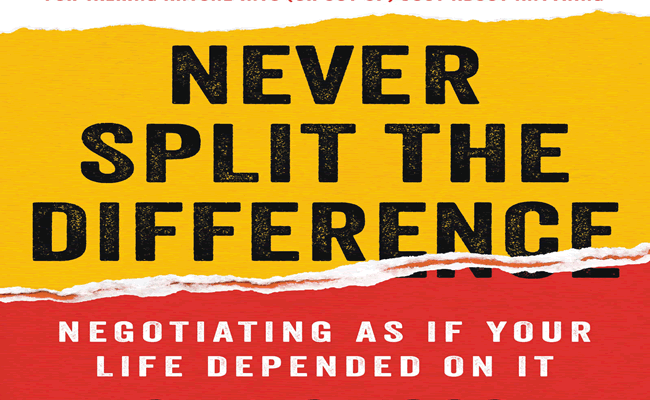

By Chris Voss
Negotiation is an often undervalued skill for product managers. Whether we want to get budget to go after a specific market opportunity or need to push back on a specific request, we need to be strong negotiators to navigate certain scenarios effectively.

Who better to learn from about negotiation than a former FBI hostage negotiator?! Chris Voss used to be an FBI negotiator in kidnapping situations and has written about his learnings in “Never Split The Difference: Negotiating as if your life depended on it”. Voss wrote this book to help us with negotiations required in a wide range of (everyday) situations, and to get us over our aversion to negotiating. “You don’t need to like it; you just need to understand that’s how the world works” Voss writes. “Never Split The Difference” is geared towards real-life situations that require negotiation skills; from negotiating a higher salary to navigating bed time with your kids.
These are the main takeaways from reading “Never Split The Difference”:
Use your voice – To ‘mirror’ your counterpart effectively, your voice plays a crucial part: Voss explains how we can use our voice intentionally to reach into someone’s brain and flip an emotional switch. There are three tones of voice that negotiators can use: (1) the late-night FM DJ voice, (2) the positive / playful voice and (3) the direct / assertive voice. Voss urges us to only use the direct / assertive voice in rare circumstances; “using it is like slapping yourself in the face while you’re trying to make progress.”

Mirroring (1) – Mirroring, also called “isopraxism”, is essentially imitation. Mirroring is something that we tend to do unconsciously, copying each other’s behaviours to comfort each other. It can be done through body language, speech patterns, vocabulary, tempo and tone of voice. Also, don’t underestimate the positive impact of simply putting a smile on your face. When people are in a positive frame of mind, they think more quickly, and are more likely to collaborate and problem-solve.

Mirroring (2) – Voss explains how for the FBI mirroring came down to repeating the last three words (or the critical one to three words) of what someone has just said. By repeating back what someone just said, you trigger a mirroring instinct and your counterpart will inevitably elaborate on what was just said and sustain the process of connecting.
Tactical empathy – “Empathy” is a word that has come up a lot recently and I like Voss’ definition of empathy: “the ability to recognise the perspective of a counterpart, and the vocalisation of that recognition.” “Tactical Empathy” goes one step beyond this, and captures the understanding of the feelings and mindset of another in the moment as well as what sits behind those feelings. This understanding helps increase your influence and overcoming any obstacles to reaching an agreement.
Labelling (1) – Labelling is a way of validating someone’s emotion by acknowledging it. Give someone’s emotion a name and you show you identify with how the person feels. Labels often begin with the same words: “It seems like __”, “It sounds like __” or “It looks like __”.
Labelling (2) – The key thing I learned about labelling is that the person labelling starts with the word “it” instead of “I”. “It seems that __” instead “I am hearing that __”. That’s because the word “I” makes people get defensive and focus on the person labelling (instead of listening to the message conveyed).
Accusation audit (1) – Voss talks about doing an “accusation audit” to disarm our counterparts whilst negotiating. The first step in the accusation audit is listing every terrible thing your counterpart could say about you. As a second step you can use role play the two sides in the negotiation, with one person making accusations and the other person disarming these, applying ‘anticipatory labels’. For example, “It seems you feel this was promised to you” or “You’re going to think we’re being harsh”.
Accusation audit (2) – The book offers a great example of such a pre-emptive and disarming reaction to accusations: “We understand that we brought you on board with the shared goal of having you lead this work. You may feel like we have treated you unfairly (thus labelling an emotion, MA), and that we changed the deal significantly since then. We acknowledge that you believe you were promised this work.”
“No” is protection – Contrary to popular belief, Voss argues, that “no” isn’t a failure. Used strategically, “no” is an answer that opens the path forward, opening the discussion up. Saying “no” can allow the real issues to be brought forward and protects people from making – and lets them correct – ineffective decisions.
Never split the difference – One’s ability to say “no” or “you’re right” are both part of the key message of this book, never to split the difference. “Creative solutions are almost always preceded by some degree of risk, annoyance, confusion, and conflict” Voss argues. He compares splitting the difference to wearing one brown and one black shoe as a result of compromising.








